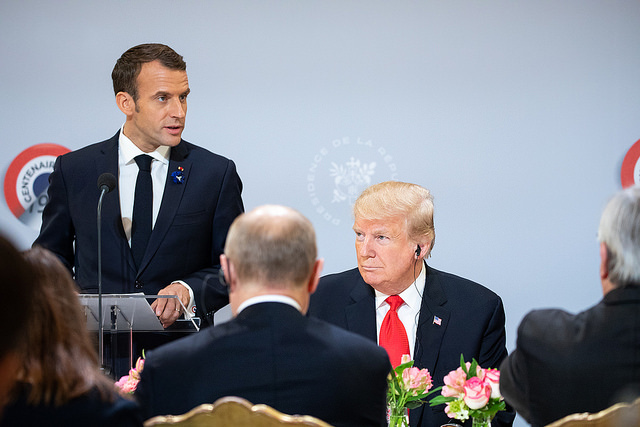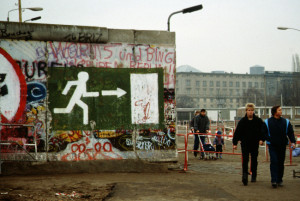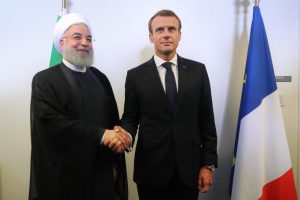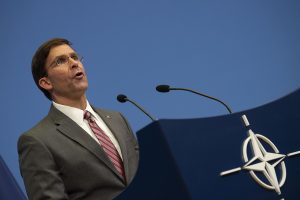By Robert E. Hunter
French President Emanuel Macron has said, “What we are currently experiencing is the brain death of NATO.” He attributes much of that to his belief that “European countries…can no longer rely on America to defend NATO allies.” He is wrong on both points, but he is right in citing U.S. President Donald Trump’s ambivalence about the Alliance, though in his meeting with Macron in London before the summit, Trump has softened his criticisms of NATO. The problem is not that NATO is brain dead, but that it has been leadership dead.
Macron has a chance to do something about this problem at the NATO mini-summit in England, which convenes on December 4. But for Macron it will be a tough slog. There is only one thing that needs to happen for this meeting to be a genuine success (and result in a great sigh of relief across the Alliance)—Trump needs to speak just 13 words, which so far he has been unwilling to do: “The United States is unalterably committed to Article 5 of the NATO Treaty.” Article 5 states that “an armed attack against one or more of [the allies] in Europe or North America shall be considered an attack against them all.” There is no actual commitment to do anything about it; that’s decided by each ally on its own, but the politics of solidarity are critical.
The bet is that Trump won’t say these few words or their functional equivalent.
Paying the Way
Trump will almost certainly once again beat up on most of the allies for not paying their fair share of defense costs, as “freeloaders.” There is a magic number agreed in 2014 that each ally should spend at least 2 percent of gross domestic product (GDP) on military matters. Only about 7 of the 29 allies do so now, though all the others have promised to do so within in a decade or so. Trump acts from the moral and political high ground, or at least the U.S. so claims: it spends about 3.7 percent of GDP on defense. That masks the fact that the United States is counting all the money spent on all its military involvements abroad, not just in Europe, even though some forces deployed elsewhere could be rushed to Europe in a crisis. An honest count shows that the United States spends less than 1 percent of GDP on European defense.
Out of political necessity, the Alliance will be giving Trump something to take home.
NATO Secretary General Jens Stoltenberg, who is naturally worried that the U.S. president will set a bad tone at the NATO meeting by excessive hectoring of allies, has noted that, in the last three years, NATO members have collectively increased their military spending by $130 billion—no rival to the U.S. defense budget, but it’s something.
Further, the allies have already agreed to a redistribution of shares by individual allies in the NATO common budgets. The US now pays 22 percent. Its share will drop to 16 percent, and Trump and the allies will all make a big deal of that. Most people don’t know, however, that these “common budgets,” both military and civilian spending by the Alliance itself, total only about $1.7 billion a year. Actual allied military forces don’t belong to NATO but to nations; and thus those monies don’t figure in common funding statistics. Dropping the U.S. share of the common budgets by 6 percent works out to about $96 million. In comparative terms, that is one-fifteenth of one percent of the U.S. military budget or about one hour and twenty minutes of what it takes to run the Pentagon. Still, Trump will be able to claim an achievement.
DeGaulle 2.0
Macron is speaking up not just because he cares about NATO and making it, again, as he might put it, “brain alive,” but because he sees an opportunity to increase French influence, as well as to represent to his constituents at home that he is exercising leadership on a world stage. There is zero chance that France could replace the U.S. as leader of the Alliance, though with all the doubts about Trump’s America, including domestic political turmoil over possible impeachment, Macron can make a play. More important is his effort to pump up a supplement to NATO, a European military force based on the European Union. No prizes for guessing who he sees as leading this force! In the process, however, he is honestly attempting to fill a major gap in European security, overall, caused by Britain’s impending departure from the EU. Even though the U.K. will still be a fully-paid-up member of NATO, it will no longer be involved in the EU’s Common Foreign and Security Policy; it will no longer be able to play a mediating role in Franco-German relations, which are now going through one of their regular tiffs. And it will no longer be part of EU efforts to shore up Central European countries and Ukraine with economic instruments and democracy-promotion. Notably, the only person outside of Britain who really likes Brexit is Russian President Vladimir Putin.
Macron is doing a useful service, though not with the finesse useful for producing a positive result, by taking on Turkey’s President Recep Tayyip Erdogan and his increasingly fractious role within the Alliance. In countering the Islamic State in Iraq and Syria, the U.S., in particular, has partnered with the Kurds, who have made a major difference. But the Kurds also have ambitions in Turkey, which are anathema not just to Erdogan, but to most non-Kurdish Turks. Macron is raising the issue, including whether Turkey is any longer a useful NATO ally. For his part, Erdogan has countered that, if he doesn’t get NATO’s help regarding the Kurds—whom he calls terrorists—he will veto NATO’s plans to increase its military role in reassuring the three Baltic states against Russian pressures. Like all allies, Turkey does have a veto. Most likely, however, the Macron-Erdogan shots across the bow will by the end of the NATO meeting be consigned to side diplomacy, and the Baltic states will get their desired reassurance.
No Substitute for America
Macron does understand that if it came to any heavy lifting in European security—that is, in case of further aggression by Russia—nothing means very much unless the United States is a full player. But Macron is gambling that the United States in its own self-interest would not stand aside if there were a real security threat to allies; and despite all the talk about where Trump stands, that is a pretty safe bet. Further, Macron wants the Alliance to take up some of French security burdens in Africa, where it has been suffering losses in its peacekeeping efforts in Mali. And—this is very much to his credit—he wants the Alliance to finally start figuring out just how far it will go elsewhere, especially in the Middle East, where U.S. engagement and policy coherence are shaky at best.
All these items are on the agenda in England, either formally or in corridor talk. Leadership is indeed needed. But in the final analysis that can only come from Washington. That’s true even for Macron’s idea of a Europe-only defense force which, as has been clear for more than two decades, depends on U.S. military support to be effective—as demonstrated in the “non-NATO” intervention in Libya nearly a decade ago.
The mini-summit this week will likely punt on the more difficult matters, and most of the allies will engage choreographed happy time (with France and Turkey being notable outliers, for domestic political reasons). The Alliance may also commission yet another “experts group” to chart NATO’s future. Except for one in 1967 (the Harmel Report) which dealt with major strategic challenges regarding the role of nuclear weapons during the Cold War, the others have just been make-work and useless.
NATO: America’s Best Investment
NATO continues to be highly relevant, at least as a regional alliance with some engagement in parts of the Middle East, as well. Certainly, it is the unmatched source of stability and security confidence in Europe. Further, though Trump and some other American NATO-doubters are unwilling to acknowledge it, firm U.S. commitment to the Alliance buys America a huge amount of influence in Europe, politically, economically, and for the U.S. private sector. Trump’s ambivalence on NATO has not made America great again; it has weakened a precious national, self-interested asset. This week he needs to show he understands this elemental truth.






“French President Macron Is Right, NATO Is Brain Dead Without U.S. Leadership”
Mr. Hunter is amazing how out of touch you and your spouse are understanding the fast changing current world affairs. Most people’ understood that this is exactly what Mr Macron meant, besides most independent analyst agreed with him, that NATO’s leadership meaning United States is brain dead, again meaning United States is incapable of accepting the current realities. Sorry to see an old diplomat incapable of accepting a changing world. He was diplomatic and tried not to name US directly or causing so much disturbance between west/ Europe and Russia.
Ever since Trump became the US president, he focused on bilateral rather multilateral be it in security, trade,climate issues.
Regarding NATO, Trump felt that it is more useful for Europe rather America. So Trump has been demanding 28 allies for 2%GDP allocation to NATO budget. It seems that European countries are Chessboard for American chequebook. Trump’s reminds trans-Atlantic alliance partners about their responsibilities and Trump called them as free riders .
NATO partners were annoyed. German leader Merkel and French president Macron proposed to have a European Army drawn from Europe exclusively. It can be deployed anywhere in globe without depending on Washington. Of late, Africa has been receiving focus from former colonial masters in peace keeping, maintenance, building measures. The US doesn’t pay much attention. It worries about Middle East.
Macron is right in describing NATO as ” Brain Death” NATO as an organization is neither failed nor dead. American leadership has failed absolutely . According to Macron ,Trump has no statesman traits in protecting liberal democratic countries. If European security is threatened or to that matter any part, American position will be in jeopardy .
Unless US and European countries patch up differences on various vital issues like Climate, nuclear weapons race, nuclear accords for civilian use, poverty in Africa, refugee crisis, economic distress across the globe is difficult to answer to the electorate.
The perpetual war economy rationale as espoused by this “2% of national GDP” is a toxic metric at best. Assailing various NATO countries for not pulling their weight is silly beyond belief. Many of these countries want the US out of their country. Period! Why should these countries pay for military policing costs. ‘Go away and we won’t have them.’ more than one has said.
But no, they stay and whine and rape and spread their version of Americana across the globe. America has no moral leadership in the world anymore. I know, I know that is so hard to understand. But just look at who has risen to the top of the military food chain. Trump is as sad a statement of failure as ever could be imagined.
The bellicose and self-centred posture to the rest of the world and meddling in everyone’s affairs is reaching critical levels. ‘Ignore the International Courts’ says the State Dep’t.
‘Ignore the Climate Change Accords’ says the WH.
Everything is taking on the toxic arrogance of an out of control hegemon.
What’s the world to do with this pseudo-democrat cum autocrat?
Tuning out the propaganda is the first thing.
And there is soooo much of it it is truly stupefying.
This column was just another example of an ideological arteriosclerosis. Think Tanks are now churning out their “policies” like a “Skip The Dishes” app.No need to think anymore, just download it and it makes its way instantly o the WH along with a the Billionaire Cheeseburger just dripping with Tomahawk onions, F-35 mushrooms with that all important Super Surveillance gravy